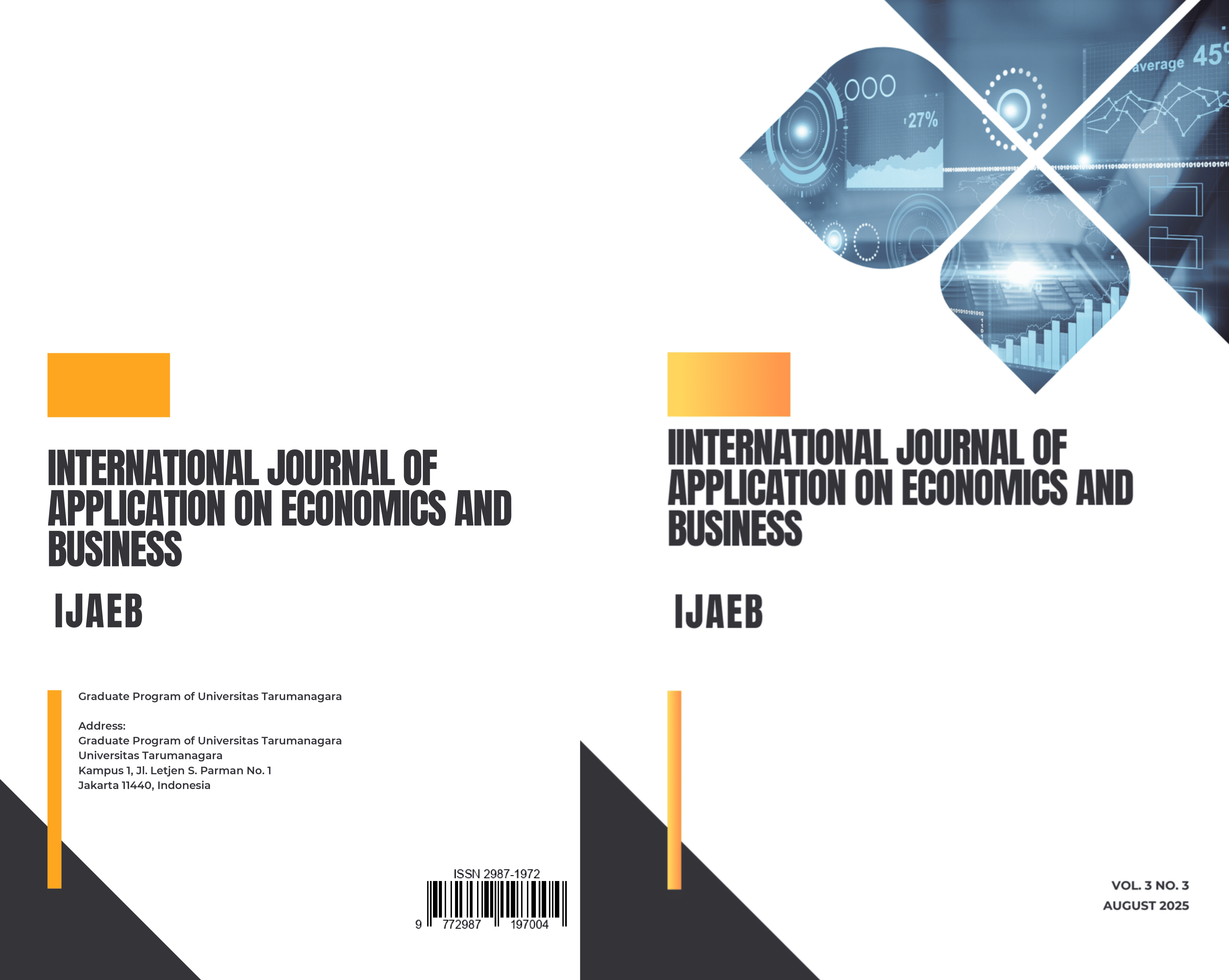EARNING MANAGEMENT AND LEVERAGE AS FACTORS AFFECTING TAX AVOIDANCE MODERATED BY POLITICAL CONNECTIONS
Main Article Content
Abstract
Taxpayers face a dilemma because taxes are an obligation and a burden, while the state is very dependent on them. This is based on a sense of injustice for those who do not pay taxes but still enjoy the same facilities. As a result, Indonesian taxpayers have begun to avoid taxes, which has caused the country to lose quite a large amount. In fact, not only do individual taxpayers avoid taxes, but corporate taxpayers also do so. This study uses earnings management and leverage variables as independent variables, political connection variables as moderating variables, and tax avoidance variables as dependent variables. This study focuses on taxpayers who are business entities or companies. Data was taken from the non-cyclical sector companies report of financial published on the IDX in 2020-2023. One hundred seventeen samples were used in this study. SPSS 25 is used as a sample processing tool, and the results obtained are that tax avoidance is significantly influenced by leverage, while earnings management does not have a significant effect on it. The results of this study also show that political connections cannot moderate the influence of the two independent variables on tax avoidance.
Article Details
Section

This work is licensed under a Creative Commons Attribution-NonCommercial-ShareAlike 4.0 International License.
This journal provides immediate open access to its content on the principle that making research freely available to the public supports a greater global exchange of knowledge.
IJAEB by Graduate Program of Universitas Tarumanagara is licensed under a Creative Commons Attribution-NonCommercial-ShareAlike 4.0 International License.. Permissions beyond the scope of this license may be available at https://journal.untar.ac.id/index.php/ijaeb
References
Amruddin, Agustina, T. S., Rusmayani, N. G. A. L., Ningsih, K. P., Wulandari, S., Yuniati, I., & Mujiani, S. (2021). Metodologi Penelitian. Penerbit Kbm Indonesia.
Ariska, M., Fahru, M., & Kusuma, J. W. (2020). Leverage, Ukuran Perusahaan Dan Profitabilitas Dan Pengaruhnya Terhadap Tax Avoidance Pada Perusahaan Sektor Pertambangan di Bursa Efek Indonesia Tahun 2014-2019. Jurnal Revenue, 1(1), 132-142. https://doi.org/10.46306/rev.v1i1.13
Ayem, S., & Titania, V. A. (2024). Ukuran Perusahaan Memoderasi Faktor-Faktor Yang Mempengaruhi Tax Avoidance. Edunomic: Jurnal Ilmiah Pendidikan Ekonomi Fakultas Keguruan Dan Ilmu Pendidikan, 12(1), 34-49. https://doi.org/10.33603/y6enez64
Eddy, E. P. S., Angela, A., & Erna. (2020). The Impact Analysis of Return on Asset, Leverage And Firm Size To Tax Avoidance. Jurnal Akuntansi, Program Studi Akuntansi, Fakultas Ekonomi, Universitas Kristen Maranatha., 12(2), 256-264. https://doi.org/10.28932/jam.v12i2.2908
Ghozali, I. (2018). Aplikasi Analisis Multivariate Dengan Program Ibm Spss 25. Semarang: Badan Penerbit Universitas Diponegoro.
Hidayanti, W., & Haryati, T. (2024). Effect Of Earnings Management, Leverage, And Csr On Tax Avoidance With Gcg As Moderating Variable. Ekombis Review – Jurnal Ilmiah Ekonomi Dan Bisnis, 12(4), 4005–4016. https://doi.org/10.37676/ekombis.v12i4.6171
Hifnalisa, K. (2022). Pengaruh Capital Intensity Dan Koneksi Politik Terhadap Tax Avoidance. Jurnal Ilmiah Akuntansi Dan Keuangan, 4(Special Issue 3). 1510–1520. https://doi.org/10.32670/fairvalue.v4iSpesial Issue 3.833
Manuel, D., Firmansyah, A., & Trisnawati, E. (2022). Manajemen Laba, Leverage Dan Penghindaran Pajak: Peran Moderasi Tanggung Jawab Sosial Perusahaan. Jurnal Pajak Indonesia, 6(2s), 550-560. https://doi.org/10.31092/jpi.v6i2S.1832
Marfiana, A., & Putra, Y. P. M. (2021). The Effect of Employee Benefit Liabilities, Sales Growth, Capital Intensity, And Earning Management On Tax Avoidance. Jurnal Manajemen Stie Muhammadiyah Palopo, 17(1). http://dx.doi.org/10.35906/jm001.v7i1.718
Nova, R. P., Saragih, T. R. N., & Napitupulu, I. H. (2021). Pengaruh Debt To Asset Ratio Terhadap Tax Avoidance. Konferensi Nasional Sosial Dan Engineering Politeknik Negeri Medan Tahun 2022, 3(1), 643-652. https://doi.org/10.51510/konsep.v3i1.866
Putra, Z. K. P., & Suhardianto, N. (2020). The Influence Of Political Connection On Tax Avoidance. Jurnal Akuntansi Dan Keuangan, 22(2), 82-90. https://doi.org/10.9744/jak.22.2.82-90
Rahmadani, Muda, I., & Abubakar. (2020). Pengaruh Ukuran Perusahaan, Profitabilitas, Leverage, Dan Manajemen Laba Terhadap Penghindaran Pajak Dimoderasi Oleh Political Connection. Jurnal Riset Akuntansi Dan Keuangan, 8 (2), 375-392. https://doi.org/10.17509/jrak.v8i2.22807
Rahmadani, I., Haryati, R., & Bustari, A. (2023). Pengaruh Capital Intensity, Sales Growth Dan Debt to Asset Ratio (Dar) Terhadap Penghindaran Pajak (Tax Avoidance) Pada Perusahaan Makanan Dan Minuman Yang Terdaftar di Bursa Efek Indonesia Tahun 2016-2019. Jurnal Riset Akuntansi, 1(1), 1-23.
Sahir, S. F. (2021). Metodologi Penelitian. Penerbit Kbm Indonesia.
Susilawati, I. (2023). Psikologi Pajak: Perspektif Mikro Perilaku Perpajakan. Universitas Brawijaya Press.
Suwandi, N. S. A., Pangaribuan, D., & Sianipar, P. B. H. (2025). Pengaruh Leverage, Likuiditas, Dan Profitabilitas Terhadap Tax Avoidance Dengan Ukuran Perusahaan Sebagai Variabel Moderasi. Jurnal Ekonomi, Akuntansi, Dan Perpajakan, 2(1), 193-213. https://doi.org/10.61132/jeap.v2i1.851
Thalita, A. A., Hariadi, B., & Rusydi, M. K. (2022). The Effect of Earnings Management On Tax Avoidance With Political Connections As A Moderating Variable. Research In Business & Social Science (2147- 4478), 11(5), 344-353. https://doi.org/10.20525/ijrbs.v11i5.1864
Ubaidillah, M. (2022). Peran Koneksi Politik Dalam Melakukan Tax Avoidance. Owner: Riset & Jurnal Akuntansi, 6(1), 781-791. 10.33395/owner.v6i1.667

